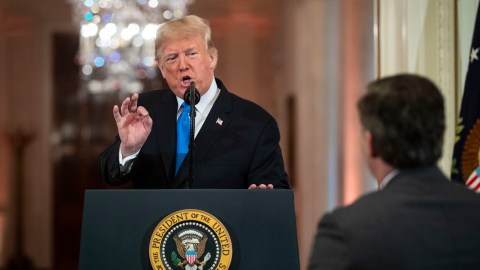CNN files lawsuit against Trump administration

(Photo by Al Drago - Pool/Getty Images)
- CNN reporter Jim Acosta’s press credentials were revoked following a heated exchange with President Donald Trump on November 8.
- The network filed a lawsuit against the administration on Tuesday, claiming the administration has violated multiple amendments.
- The White House may only revoke the press credentials of journalists for “compelling reasons,” not for reasons involving content.
CNN has filed a lawsuit against the Trump administration for revoking the press credentials of Jim Acosta after a heated exchange between the reporter and the president.
During a November 8 White House press conference, Acosta challenged Trump about the migrant caravan and the Russia probe. Trump became irritated by Acosta’s challenge, calling him a “terrible person” and telling him to “just sit down.” A White House intern attempted to grab the microphone from Acosta, who initially refused to cede it. The administration revoked Acosta’s press badge, known as a Secret Service “hard pass”, later that day.
“The wrongful revocation of these credentials violates CNN and Acosta’s First Amendment rights of freedom of the press and their Fifth Amendment rights to due process,” CNN wrote in a statement.
CNN has requested Acosta’s credentials to be restored immediately.
In its lawsuit, CNN claims the administration violated the First Amendment by denying its reporter access to the White House, and violated the Fifth Amendment by denying due process in its decision to revoke Acosta’s credentials. The lawsuit also claims the Secret Service made a final agency decision when it revoked the credentials without a hearing before a judge.
The defendants named in the lawsuit are Trump, chief of staff John Kelly, press secretary Sarah Sanders, deputy chief of staff for communications Bill Shine, Secret Service director Randolph Alles, and the Secret Service officer who revoked Acosta’s hard pass.
CNN Worldwide president Jeff Zucker said in an internal memo to staff that the White House’s move was “unprecedented” and that the decision to file the lawsuit was not made lightly.
Acosta wrote in a statement:
“I have always endeavored to conduct myself as a diligent but respectful reporter who asks probing but fair questions. The revocation of my White House press credential not only destroys my ability to perform my current job, it will follow me for the rest of my career. My reputation and my future career prospects have all been significantly harmed if not completely devastated.”
Does CNN have a case?
The president and many of his supporters might have perceived Acosta’s line of questioning to be disrespectful or annoying. For instance, ousted Fox News host Bill O’Reilly said on his YouTube show that reporters should indeed ask tough questions of the president, but what Acosta did was to attempt to enter a televised debate with Trump.
In any case, the Trump administration will have difficulty barring Acosta from the White House if being disrespectful is the only reason it lists.
In its lawsuit, CNN noted Sherrill v. Knight, in which a D.C. Circuit Court ruled in 1977 that journalists’ access to the White House cannot “be denied arbitrarily or for less than compelling reasons,” including for the content of their reporting.
One compelling reason for barring a journalist would be concerns about the president’s physical safety, though that’s almost surely not going to fly in federal court, as Judge Andrew Napolitano, the top legal analyst at Fox News, said:
“The only grounds for revoking the pass are, is the person a danger to the physical security to the president or his family? Obviously — Acosta may have been an irritant to the president — but he was hardly a danger to him,” Napolitano said on Fox Business on Tuesday morning. “So I think CNN’s got a very good case. I think this will be resolved quickly. I don’t expect a jury trial. I think it will either be settled or CNN will prevail on motion.”
Multiple press and First Amendment organizations have expressed support for restoring Acosta’s press credentials.
Olivier Knox, the president of the White House Correspondents Association, said that “revoking access to the White House complex amounted to disproportionate reaction to the events of last Wednesday. We continue to urge the administration to reverse course and fully reinstate CNN’s correspondent. The President of the United States should not be in the business of arbitrarily picking the men and women who cover him.”
The ACLU said in a statement that “it is un-American and unlawful for the president to expel a reporter from the WH briefing room for doing his job. It shouldn’t take a lawsuit from CNN to remind the president of the First Amendment.”
White House Press Secretary Sarah Sanders said the lawsuit was “more grandstanding from CNN,” and that Acosta has routinely “inappropriately refused to yield [press conference time] to other reports.”
“The White House cannot run an orderly and fair press conference when a reporter acts this way, which is neither appropriate nor professional,” Sanders said. “The First Amendment is not served when a single reporter, of more than 150 present, attempts to monopolize the floor. If there is no check on this type of behavior it impedes the ability of the President, the White House staff, and members of the media to conduct business.”
Ultimately, the case will likely hinge on the question of whether the administration’s decision to revoke Acosta’s hard pass was based on the content of his questions and reporting, as First Amendment lawyer Floyd Abrams told The Washington Post.
“It cannot happen because of disagreement with a journalist about the content of his or her reporting,” Abrams said. “It cannot happen in an effort to retaliate because of prior reporting.”





